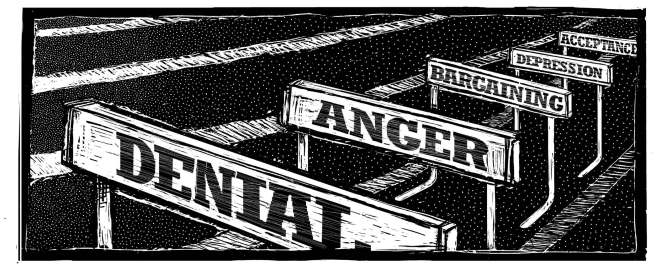BY: SOPHIA VOUMAKIS
I’ve been thinking lately about the grieving process I went through after I sustained a traumatic brain injury (TBI) in May 2011. It was a long and difficult journey.
Swiss psychiatrist Elisabeth Kübler-Ross first introduced her five stages of grief in 1969. Although the theory was developed as a result of her work with patients who were dying, the theory has been used to describe the grieving process people typically go through when they sustain other types of losses. The Kübler-Ross stages of grief are: denial, anger, bargaining, depression, and acceptance.
From my own experience grieving my TBI, I would add two more stages prior to acceptance: awareness and adjustment.

In sharing my journey through the stages of grief, perhaps other TBI survivors, their families and caregivers will better understand the emotions and behaviours that TBI survivors exhibit as they move from denial to, hopefully, acceptance.
I did not experience the stages of grief linearly, I did, and still do, almost four years later, float between the different stages. It is also possible that an individual may not experience all the stages.
Denial
The first thing I did when I awoke in the hospital was to call the office to let them know I’d be a little late coming in that morning. There was nothing wrong with me even though I had been unconscious for over an hour, my body was badly banged up, and as we were to discover later that morning, I had a brain hemorrhage.
My denial continued for months – I returned to work within two days of being released from the hospital and struggled.
Anger
I wasn’t coping well with my return to work. My bread and butter had been research – numbers and statistics. I quickly discovered that I could no longer make sense of numbers charts, graphs, and statistical analysis.They were incomprehensible to me. Panic and then anger overwhelmed me.

Bargaining
My family doctor recommended three months off work. I bargained with her and myself and agreed to three weeks. I then attempted another return to work. Again, I couldn’t cope. So I struck another bargain with myself and my doctor, to work half-days. When that didn’t work, anger reappeared.
Depression
Realizing that I wasn’t coping in my professional and personal life lead to depression. What was the matter with me? On some level, I understood that the physical exhaustion, loss of my ability to make sense of numbers, and mental fatigue was somehow related to my injury, but I was determined that this injury was not going to impact my life – denial once again!
Awareness
In August 2011, my neurologist referred me to an occupational therapist for an assessment. Again, denial reared her head – there was nothing wrong with me and I didn’t need an assessment. Luckily, my family who had noticed the myriad of physical, cognitive, and emotional difficulties I was experiencing, but denying to myself, encouraged me to go for the assessment. It was during my assessments and subsequent treatments that I began to accept that my injury had left me with physical, cognitive, and emotional deficits. Anger, followed by depression resurfaced.
Adjustment
This phase started in September 2011 and continued for almost two years. During this time I worked with my occupational therapist, and together we developed strategies to deal with the physical, cognitive, and emotional impacts of my TBI. These strategies included: physical exercise, cognitive training, and the adjustment of my environment.

Acceptance
It took me a long time to accept the new me and my new reality. When I am diligent about employing the strategies I developed with my occupational therapist to cope with my deficits I have a good day. When I forget, and slip into denial again, my days are not so good. This is once again followed by anger and bouts of depression. Luckily, these don’t last too long; because I am now aware of the impacts of my TBI, and I go back to diligently employing my coping strategies.
I found that having a framework by which to make sense of my emotions and behaviours as I went through my grieving process helped me to understand that what I was experiencing, and the decisions I was making were not at all unusual for a person grieving a loss.
Since her TBI in 2011, Sophia has educated herself about TBI. She is interested in making research into TBI accessible to other survivors.
Filed under: Grief, Survivor Stories Tagged: ABI, acceptance, adjustment, anger, awareness, Brain injury, denial, depression, Grief, stages of grief, TBI
![]()
Source: BIST Blog




